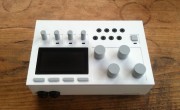There have been so many music-focused software titles released in the last decade or so that it might have become hard to take them seriously in the present day. The mold for interactive music games got broken with Guitar Hero and games that immediately followed tried, at the very least, to work with that formula because it had been so well received by the general public.
It is because of this inevitable trend, that if a game starts out with a premise of “console + instrument + winning or losing” that consumers may almost default to believing the game structure is all about imitating a particular instrument and that the content is mostly about notes and pitch and emulating real songs. Such is not the case with Cello Fortress, a game moving away from plastic controllers and even moving away from incorporating a primary goal of traditional music education.
Cello Fortress was first brought to light in the gaming world some months back but there was not a lot to go on since the idea was still in heavy conceptual development. The game now has a trailer ready for viewing and the game’s creator, Joost van Dongen, is supporting this with a tour of the game prototype around different locations in the Netherlands, where Dongen resides. Game development is Dongen’s day job but he has kept the cello at close hand as a long time side activity over the past two decades and combining these two skills gave way to Cello Fortress. The game utilizes the Xbox 360 and features four players trying to take down a fortress with cannons and defenses of its own. The cello comes into play in using the music it makes to control these defenses and prevent the players using traditional gaming controllers, from successfully invading.
Based on this initial description, Fortress is slanted more toward a shooter style game than anything else but Dongen says in his blog, that “music is [still] central to the game.” The concept for cannon control is run by an improvisational performance. As described by VentureBeat, “Playing fast notes fires the guns, or low notes activate mines and so on…” The focus isn’t on copying note prompts on a screen or any specific melodies but Dongen aims for the notes played to still sound appealing and blend to create a sequence of enjoyable music during gameplay.
Graphics and other game elements are only prototypes to provide full demonstration and are liable to undergo a major transformation over time. Images aside, to see this collaboration effectively in action is still rather amazing. The only functional setback at the moment, is that in order to get the game in full swing, a skilled cellist is needed, since there are no fake instruments involved.
One has to wonder though, what it would be like for perhaps, an intermediate cello student. If nothing else, Cello Fortress could be a great unconventional exercise; unconventional even against the premise of improvisation itself. It would force students to think on their feet in a way different from a traditional improv classes, where inhibitions or anxiety might still create difficulties in personal growth. If a student had to partially concentrate on immediate actions happening outside of their instrument and themselves, the notes would have to be played but the focus on self-awarness and self-consciousness might be reduced and students could develop a certain level of comfort for musical ad-libbing.
The trailer for Cello Fortress is below: (The timpani in the background were added for effect but the cello’s music was all played on the spot and filmed for use).
Kira is an old school music nerd with a love for all things creative; always searching for music’s common ground. She graduated with an M.A. in Performing Arts Administration from New York University. Drop her a tweet @shadowmelody1



![[Interview] With Their Stunning Crystallized Volcano, Krewella Hopes to Blow Fans’ Minds](https://www.soundctrl.com/blog/wp-content/uploads/2013/09/Identity_Set-180x110.jpg)

![[Interview] Billy Chasen, Co-Founder of Turntable.fm, Discusses Turntable Live](https://www.soundctrl.com/blog/wp-content/uploads/2013/10/Screen-Shot-2013-10-09-at-2.33.34-PM-50x50.png)
![[Interview] Matt Loszak, Founder of JamCam](https://www.soundctrl.com/blog/wp-content/uploads/2013/10/Slide11-50x50.jpg)








Comments are closed.